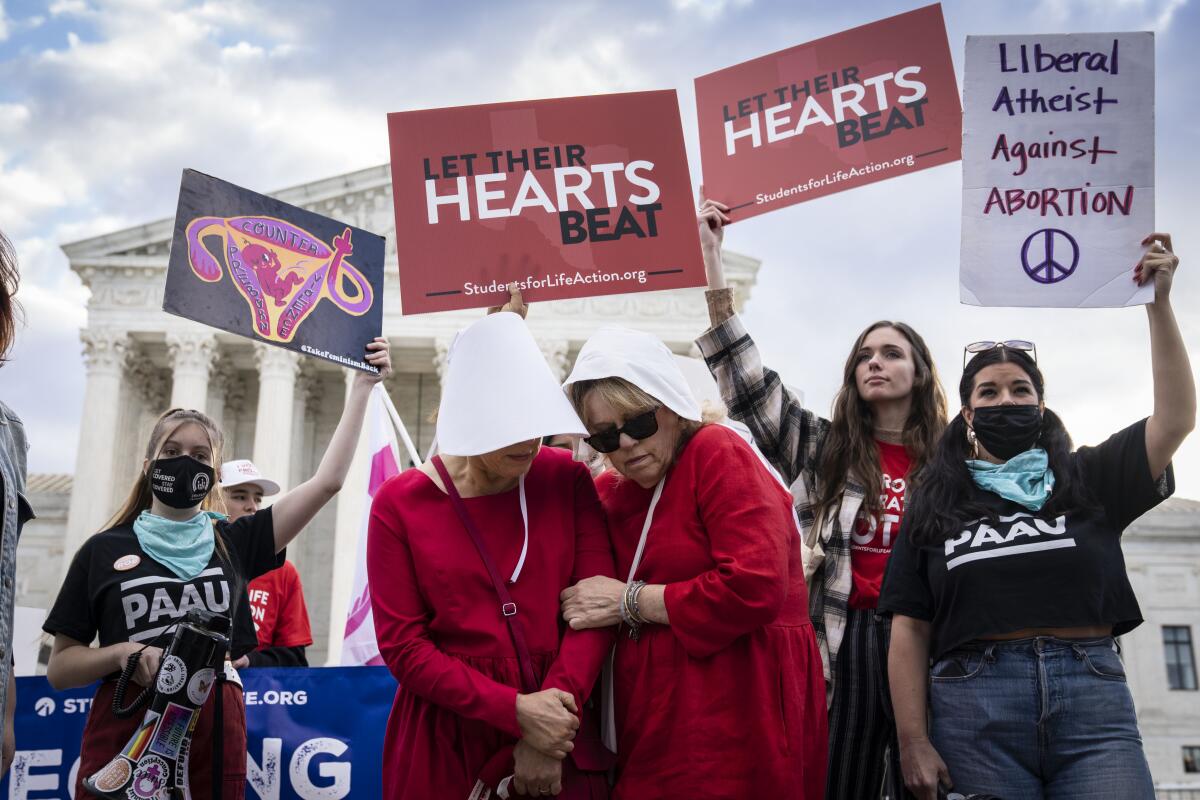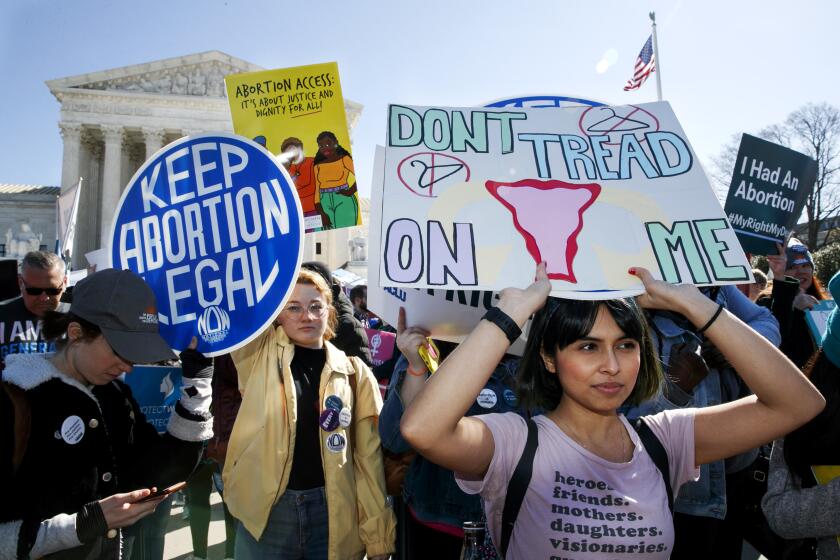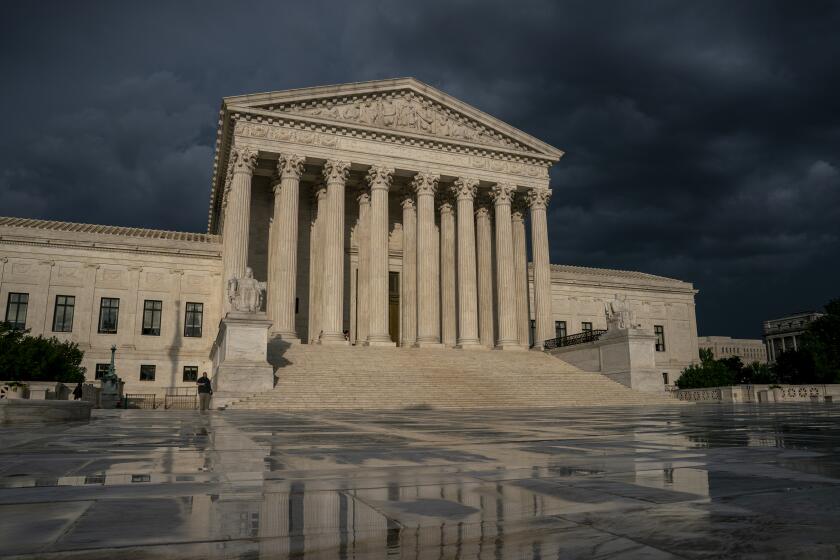Op-Ed: The abortion case before the Supreme Court may take away the fundamental right to reproductive freedom

- Share via
Whatever the Supreme Court decides about abortion rights in Dobbs vs. Jackson Women’s Health Organization is sure to intensify the political fight over abortion. The issue in Dobbs, which will be argued on Wednesday, is the constitutionality of a Mississippi law that prohibits abortions after the 15th week of pregnancy.
This is the most important abortion case to come before the court in almost three decades, since it decided Planned Parenthood vs. Casey in 1992. In that case, to the surprise of many, the court, in 5-4 decision, said that it was reaffirming the “essential holding” of Roe: “a recognition of the right of the woman to choose to have an abortion before viability and to obtain it without undue interference from the State.”
Fetal viability, with medical technology, is now at about 24 weeks of pregnancy. If the court upholds the Mississippi law, which bans abortions long before viability outside the uterus, it would erase the fundamental framework of the constitutional right presented in the Roe and Casey decisions.
The Supreme Court is hearing a case asking it to overturn Roe vs. Wade, but it should reject it and continue to protect access to abortion.
Those who believe that the conservative court’s ruling in Dobbs, whatever it is, will lessen the social and political fight over abortion are badly mistaken. There are three possible approaches the court could take, and each would increase the fight over abortion in legislations and elections.
The court deciding to follow precedent and declare the Mississippi law unconstitutional is the least likely outcome. Five of the justices — Clarence Thomas, Samuel A. Alito Jr., Neil M. Gorsuch, Brett M. Kavanaugh and Amy Coney Barrett — have strongly criticized the Roe decision in either their judicial opinions or nonjudicial writings. Chief Justice John G. Roberts Jr. has voted to uphold virtually every abortion restriction to come to the court since he joined it in 2005.
But even if the court strikes down the Mississippi law, state legislatures are certain to look for other ways to restrict abortions. Between 2011 and 2021, 573 restrictions on abortion were adopted by state legislatures. In the first six months of this year, 90 state laws were enacted restricting access to abortion, more than in any year since Roe was decided in 1973. These laws take a myriad of forms, such as the Texas law prohibiting abortions after the sixth week of pregnancy and authorizing civil suits against doctors who perform abortions or those who aid or abet the procedure. Eight states adopted laws this year to limit medically induced abortions, such as by prohibiting telemedicine prescriptions and requiring medications to be taken in person in a doctor’s office.
I think the most likely outcome will be for the court to uphold the Mississippi law without explicitly stating that it is overturning Roe — even though that is exactly the effect. Once the court says that a state can prohibit abortions before viability, it has demolished the central holding of Roe — leaving nothing to stop states from banning all abortions.
The court’s majority is poised to reshape constitutional rights and protections in ways this nation has not seen in generations.
This will encourage states with conservative governments — and 23 states have both a Republican-controlled legislature and a Republican governor — to adopt laws prohibiting abortions even earlier than Mississippi’s 15-week ban. This year, for example, four states (Idaho, Oklahoma, South Carolina and Texas) adopted bans on abortion at six weeks of pregnancy with very limited exceptions. Both Arkansas and Oklahoma enacted legislation that bans abortion at any point in pregnancy, except when the woman’s life is endangered.
The final possibility is to explicitly overrule Roe and end constitutional protection for abortions. The issue of abortion rights would then be left to each state to decide, probably making it a huge issue in countless state and local elections. State courts could conceivably provide protection of abortion rights under state constitutions — which would very likely ensure that future judicial elections, which exist in 39 states, will focus on abortion.
Abortion will become an issue in national elections more than ever before. Abortion-rights supporters will push hard for a federal law protecting a right to abortion for all women in the United States. But opponents of abortion rights will fight vehemently for Congress to adopt a law prohibiting all abortions in the country.
Some might argue that abortion rights should be left to the political process. But protection of fundamental rights should not be left to legislatures. For almost a century, the Supreme Court has held that personal “liberty” is safeguarded by the Constitution, leading in time to the constitutional right to privacy and reproductive autonomy.
Ultimately, the central question concerning abortion is who should decide whether a woman can terminate a pregnancy. For almost 50 years, it has been a woman’s right to decide before viability. Upholding the Mississippi law would hand that decision over to government and take away the fundamental right to reproductive freedom.
Erwin Chemerinsky is dean of the UC Berkeley School of Law and a contributing writer to Opinion. He is the author most recently of “Presumed Guilty: How the Supreme Court Empowered the Police and Subverted Civil Rights.”
More to Read
A cure for the common opinion
Get thought-provoking perspectives with our weekly newsletter.
You may occasionally receive promotional content from the Los Angeles Times.












